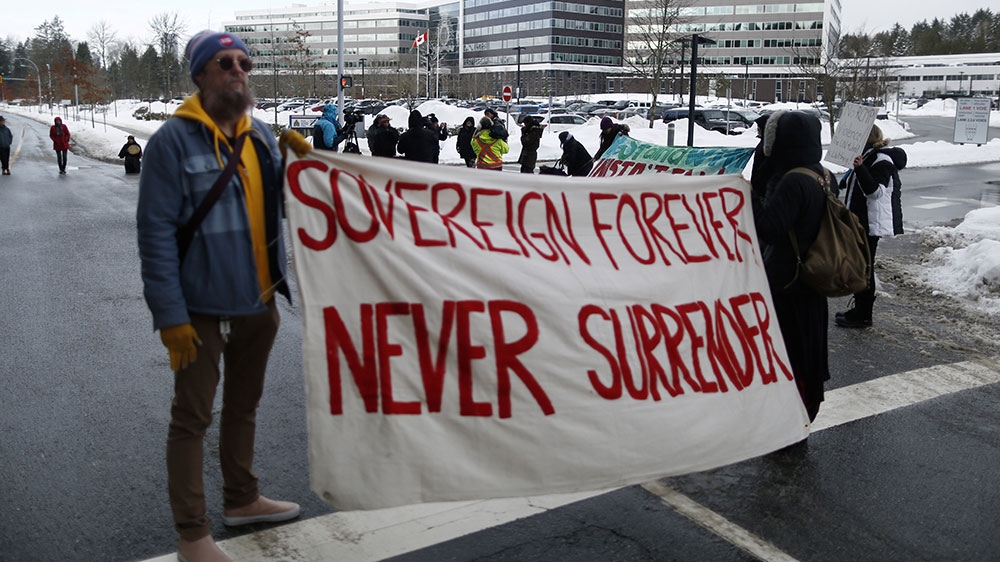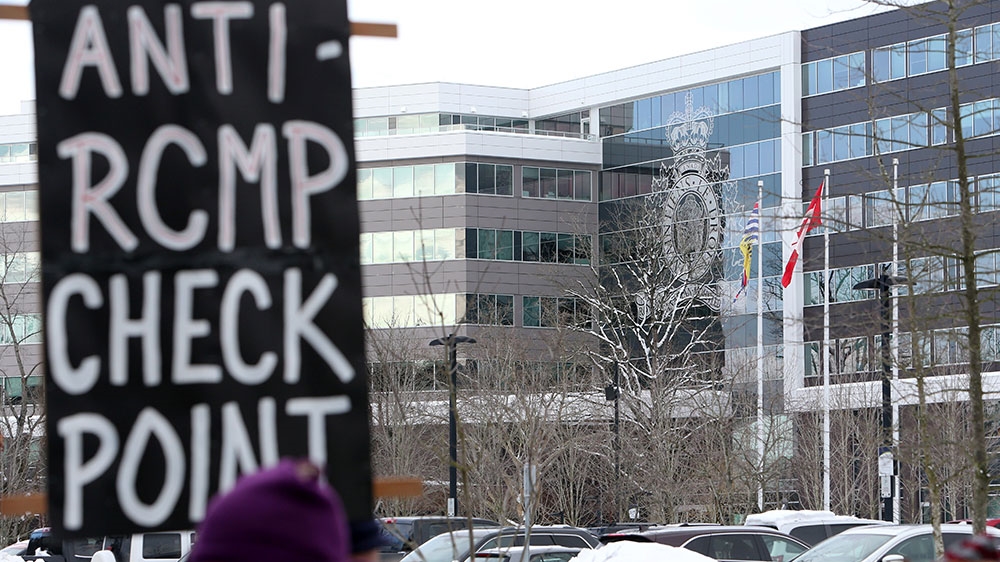Protests spread across Canada to support Wet'suwet'en hereditary chiefs who say they were not consulted on a pipeline.
by Jillian Kestler-D'Amours
23 hours ago
Montreal, Canada - Canada is facing a national crisis.
That was how Sophia Sidarous, a young Indigenous organiser and member of Metepenagiag First Nation in New Brunswick, described the feeling this week, as people across Canada came out to support members of the Wet'suwet'en Nation who were forced off their traditional lands.
More:
Canada police begin clearing Wet'suwet'en land defender camps
Interactive: Nations Divided: Mapping Canada's pipeline battle
A year after RCMP's violent raid, Wet'suwet'en people fear repeat
Sidarous was among about two dozen people who occupied the Ottawa office of Canada's minister of justice and attorney general, David Lametti, on Monday in solidarity with Wet'suwet'en land defenders opposed to a pipeline project on their territory in northern British Columbia (BC).
"We just wanted to remind him ... that he has certain obligations to fulfil," Sidarous told Al Jazeera in a phone interview, "including upholding human rights ... [and] upholding a nation-to-nation relationship, which does not mean you have to bulldoze people over in order to get a project in."
Federal police (RCMP) officers earlier this month evicted members of the Wet'suwet'en Nation from their traditional territories, where they had set up camps to try to stop construction on the Coastal GasLink project.

Supporters of the Wet'suwet'en nation, who oppose the construction of the Coastal GasLink pipeline, protest outside the provincial headquarters of the RCMP in Surrey, BC [Jesse Winter/Reuters]
The Wet'suwet'en hereditary chiefs, who hold authority over 22,000sq kilometres (8,494sq miles) of land, said they never consented to the 670km (416-mile) pipeline, which will cut across that area to transport natural gas from northeast BC to a terminal near the town of Kitimat.
The BC Supreme Court in December granted Coastal GasLink an injunction to continue building the pipeline and the company said it has reached agreements with 20 First Nations band councils along the route. The province also says the project has the necessary permits to move forward. "This project is proceeding and the rule of law needs to prevail in BC," Premier John Horgan said last month.
The hereditary chiefs argue that the band councils only hold limited authority over what happens on reserves, the First Nations communities established under Canada's Indian Act, while they hold decision-making power over the nation's traditional territory. The Supreme Court of Canada ruled in 1997 that the Wet'suwet'en hereditary chiefs never ceded authority over their lands.
What you do to one Indigenous person or one Indigenous nation affects all Indigenous peoples across Canada, across Turtle Island [North America] and across the world.
SOPHIA SIDAROUS, MEMBER OF METEPENAGIAG FIRST NATION
More than two dozen Wet'suwet'en land defenders and their supporters were arrested, APTN reported, in separate RCMP raids on a forestry road where camps and blockades had been erected to impede construction on the pipeline.
"When we see elders being disrespected by foreign entities like pipeline companies and when we see the Canadian government not respecting Indigenous peoples' rights, well that doesn't really fly with us," said Sidarous. "What you do to one Indigenous person or one Indigenous nation affects all Indigenous peoples across Canada, across Turtle Island [North America] and across the world."
Solidarity actions
Sidarous is one of many Indigenous people across Canada who have organised actions in solidarity with the Wet'suwet'en hereditary chiefs and land defenders.
Rallies, sit-ins and blockades have been organised in provinces from coast to coast to demand that RCMP officers leave Wet'suwet'en territory and that both the federal and BC provincial governments respect Indigenous sovereignty and rights.
In BC, people blocked access to the Port of Vancouver late last week and police arrested 43 people on Monday when they refused to clear the area. Traffic has also been temporarily halted in downtown Vancouver and on a bridge leading into the city, while Indigenous peoples and their supporters also blocked access into the provincial legislature in Victoria on Tuesday.
Natalie Knight, a Yurok and Navajo organiser based in Vancouver, was among dozens of people who occupied the office of BC Attorney General David Eby on Thursday morning.
Knight told Al Jazeera in a telephone interview from the sit-in that people were calling on Eby to respect Wet'suwet'en law and uphold the principles of the United Nations Declaration on the Rights of Indigenous Peoples (UNDRIP), among other demands.

Supporters of the Wet'suwet'en nation protest by blocking a road outside the provincial headquarters of the RCMP in Surrey, BC [Jesse Winter/Reuters]
Passed into law in BC in November 2019, UNDRIP states that Indigenous peoples should have "free, prior and informed consent" on matters that affect their rights, including resource development projects like the Coastal GasLink.
"This moment is a moment to take action and express our dissent," said Knight.
She said many people have rallied around the Wet'suwet'en because their struggle touches on deeper issues such as Indigenous land rights and sovereignty, and continuing colonialism in Canada. "People are really coming together, and community is being built in an incredible way on the streets," she added.
Railways blocked
Major railways have been blocked in solidarity with the Wet'suwet'en, as well.
On Thursday afternoon, Via Rail Canada - the country's passenger rail company - announced it was cancelling service along its network "effective immediately and until further notice". Via Rail operates more than 500 trains per week across 12,500km (7,767 miles), the company says.
Service had been suspended along the popular Toronto-Montreal line as a result of a blockade in Tyendinaga Mohawk Territory in Ontario. More than 250 trains and over 42,000 passengers had been affected, CBC News reported earlier this week, while industry experts said millions of dollars have been lost due to the stoppage.
Similar blockades also were erected in northern BC and in Manitoba, a province in central Canada.
The Gidimt'en Access Point, a blockade and camp erected by members of the Wet'suwet'en Nation's Gidimt'en clan, welcomed the news of the Via Rail shutdown on Thursday. "Canada is officially shutting down! We are so grateful for all the actions of solidarity," the group wrote on Facebook. "Keep up the pressure! We want the RCMP and CGL off our yintah [land]! We will not stop until they are."
Keeping warm on the Halifax solidarity blockade with the #wetsuweten, now 3.5 hours strong!#ShutCanadaDown #ShutDownCanada #wetsuwentenstrong #Unistoten #unistotensolidarity #AllEyesOnWetsuweten pic.twitter.com/PQ3MZUNZyx— Sakura Saunders (@sakura1979) February 11, 2020
South of Montreal in the province of Quebec, a Canadian Pacific Railway line has also been forced to stop operating after people from the Kahnawake Mohawk First Nation set up a blockade on their territory in solidarity with the Wet'suwet'en hereditary chiefs and land defenders.
On Thursday morning, four people huddled around a fire next to the Kahnawake blockade. A plastic chair sat atop a large pile of snow set on the train tracks behind them. "RCMP OFF Wet'suwet'en LAND" read a cardboard sign leaning up against a snowbank next to the bright red flag of the Mohawk Warrior Society. "NO PIPELINE!" read another.

Signs from Kahnawake, a Mohawk First Nation, where people have set up a blockade [Jillian Kestler D'Amours/Al Jazeera]
People at the blockade did not answer Al Jazeera's requests for comment. "We're fighting so they can live in a country with free people and clean water. We're fighting for life," James Nolan, who was at the site this week, told The Montreal Gazette newspaper.
In the nearby town of Delson, Quebec, a railway station on the affected line was empty on Thursday. "Service interrupted due to a protest near the train tracks," read a message in French displayed on a screen on the train platform.
"It's incredibly inspiring and powerful to watch because this is the greatest display of sovereignty since Standing Rock," said Catie Galbraith, 19, referring to the Indigenous-led movement in opposition to the Dakota Access Pipeline project in the United States.
"It feels as though we have reached a turning point, that Indigenous peoples are more powerful than we've ever been and we're fighting back in a way that's more effective than it's ever been. It just feels like we're on the verge of a real shift."
Galbraith, a member of the Chickasaw Nation of Oklahoma and co-chair of the Indigenous Student Alliance at McGill University in Montreal, helped organise a sit-in last Friday and a demonstration on Monday at Canadian Prime Minister Justin Trudeau's constituency office in the city.
About 30 people participated in the sit-in, she said, while a few hundred people took part in the demonstration. "There was just kind of a feeling of having to do something," Galbraith told Al Jazeera.
People were especially moved to act because a member of the Indigenous community at McGill was arrested at one of the Wet'suwet'en camps. "It hit very close to home," she added.
'Not standing down'
On Wednesday, Horgan, the BC premier, criticised the recent Wet'suwet'en solidarity rally in Victoria. "It was unacceptable to me and I know it's unacceptable to a vast majority of British Columbians," said Horgan about the participants who blocked staff from entering the provincial legislature.
"Peaceful demonstration is fundamental to our success as a democracy, but to have a group of people say to others, 'You are not legitimate. You are not allowed in here. You are somehow a sell-out to the values of Canadians,' is just plain wrong," he said.
Late on Thursday, the BC Supreme Court issued an injunction giving the authorities the power to arrest anyone impeding the work of the legislature or blocking access to the buildings. People will be picketing BC government offices on Friday to show continued support for the Wet'suwet'en.

Supporters of the Wet'suwet'en nation protest outside the provincial headquarters of the RCMP in Surrey, BC [Jesse Winter/Reuters]
Trudeau addressed the demonstrations this week, saying that while he respected peoples' right to protest peacefully, Canada "is also a country of the rule of law".
"We need to make sure those laws are respected. That is why I am encouraging all parties to dialogue to resolve this as quickly as possible," the prime minister, who had promised to make reconciliation with Indigenous peoples a top priority, told reporters.
Meanwhile, federal Indigenous Services Minister Marc Miller on Thursday offered to meet some of the protest leaders if they promised to discontinue their railway blockades.
But Knight said she and others were undeterred as their demands had not been met. "In the same spirit of the [Wet'suwet'en] hereditary chiefs not standing down, not being bullied by the RCMP … we will do the same in the streets here in Vancouver. We are not standing down."
MORE ON INDIGENOUS RIGHTS
A victory over Sweden's colonialism3 days ago
Australian High Court rules Indigenous people cannot be deported4 days ago
The Indian school where Indigenous children are 'never outsiders'5 days ago
'Our feet grow into the ground': The Ojibwe women owning the shorelast week
SOURCE: AL JAZEERA NEWS
No comments:
Post a Comment